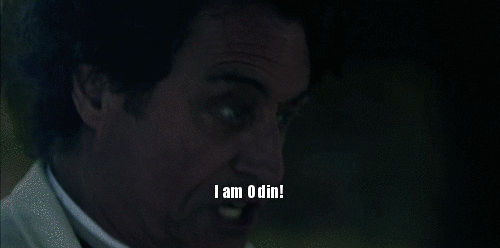Oh look, American Gods did it again! Of course by that I mean taking yet another scene that’s post “House on the Rock”, in this case even beyond Lakeside, and moved it well before it’s supposed to be shown. It’s similar to what I said about Shadow and Wednesday’s abduction by Mr. World’s minions. Of course it does follow the formula of that scene but the show altered it. Perhaps so that they could still use the original event in the future without it coming off as repetitive.
Yet, beyond this noticeable criticism from book to show, this finale was actually really well done. For one, Easter or her proper name, Ostara (I’m a practicing pagan myself) or Ēostre, was given a lot more significance to her standing as a Goddess than she was given in the book. The scene wasn’t so far removed from the events in the book, which was good, but more of that later.
This episode was heavy on revelation, especially the accusation of Wednesday and Mad Sweeney for being responsible for Laura’s death. That’s not exactly canon in the novel, but it is certainly implied. By the end, we do finally get a nice set up to what will be the “House on the Rock” scene for next season.
As far as being a season finale goes, this was a great point to end the season on. Revelations, a proclamation of war, and show of just how these Gods and Goddesses can still stand up to the New Gods with whatever power they can muster. I would have liked to see the “House on the Rock” event for a finale, as it is a far more pivotal moment in the series, but of course it is much earlier than the halfway point of the book. Maybe as a S3 finale? Then again, that would be too far down the road.
Somewhere in America
This was great way to merge both of the book’s versions of the vignettes “Coming to America” and “Somewhere in America”. The difference of course being a tale from the distant past as opposed to what is going on currently somewhere in the world. In this particular one we begin by seeing Shadow and Wednesday in Mr. Nancy’s home being somewhat pampered and forced to listen a story by the legendary storyteller himself. I like that they constantly reprise his most noteworthy quote from the second episode, “Anger gets shit done”.
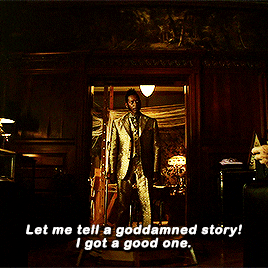
In this scene we do get a little more of a backstory for Bilquis. Well, not so much backstory as more of her during her reign in the good old days when she was worshipped as a Queen. The main theme in this sequence is how she manages to overcome all the men who have tried to take her throne over the years. From her days in the temple to her life in the 1970’s, she has always managed to overcome the men trying to take away any power women have.
As time goes by, people begin to stop feeding her the power that keeps her a Goddess, whether it’s a symbol for STD’s and the dangers of unprotected sex or her body is just beginning to wither away, you can tell that she is dying. A particular news report relevant to today’s issues shows ISIS tearing her old temple apart, further putting her into a pit of despair. That is until the Technical Boy offers her a way to get her worshippers back in the form of a Tinder-like app called Sheba. As more time passes the Technical Boy does call upon her to return the favor, while she tries to seduce him into not having to go through with it. In the end she becomes his pawn and heads to Wisconsin.
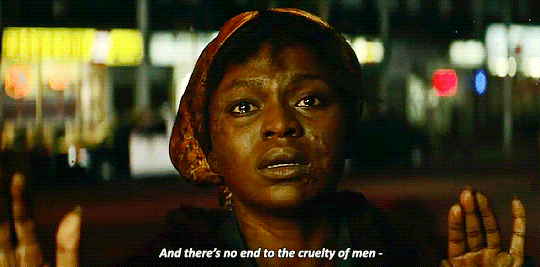
I’m not sure if this scene will make it to the second season given that they’ve already introduced Bilquis to the Technical boy. In the novel they don’t meet until the interlude. The app of course is still present in the book, but it’s generic and she has become dependent on it to get dates. However, the Technical Boy does end up catching up to her in his limo as a John waiting for sex. When she realizes who he is, she lies and claims her name is Ayesha but to no avail. By the end of the interlude she is hit by the limo and killed. This scene of course may still happen but the show will likely make it much more personal. What I’m excited to see is what role she’ll play in the next season as she becomes a spy for the New Gods.
That’s A lot of Jesus
I actually found this pretty funny. A lot of the dialogue used by Easter herself in these scenes was pretty on spot in context to how Wednesday was trying to convince her to join his cause. But like her namesake, Easter or Ostara was a Celtic festival to celebrate the coming of the spring equinox and symbol of creation and rebirth. The same way this holiday was adopted into Western Christianity and reimagined to support its own needs, so too was this scene changed and rethought to serve the series’ purposes.
The change of setting in this scene was the first thing that made me realize that they were going to change the scene heavily. I mean, the book introduction to Easter was merely six pages and had no real significance. Not enough to warrant it being used as a season finale, so obviously things were going to be changed up. Rather than taking place at a picnic in the park in which Easter gives out extravagant amounts of food away, the show built upon on the fact that she was rich and decided to host a great banquet at her mansion. In the novel she probably means rich in terms of believers, rather than literal wealth.
It should also be noted that the novel placed this scene in the middle of January in San Francisco, not on Easter Sunday in a park in Kentucky. Rather than her patrons being lots of hungry children, she seemed to have a house full of Jesus! Again like Wednesday had mentioned a few episodes back, there was a Jesus for almost every part of the world. Here, we saw just how many. Of course, since the Christian Easter is the celebration of the resurrection of Christ it makes sense that they would all be there.
Either way the scene moves on after the reprisal of Wednesday’s speech and Shadow is finally introduced to Easter. His reaction to Easter’s beauty, an almost boy-like thunderstruck wave of love and lust, is just as adorable as it was in the books. He’s basically star struck. I love that they kept all of what Easter says in context, calling Shadow a blusher and basically reciprocating his own mesmerized attitude.

By this time in the books, the trio has wound up retreating to a local diner to talk further. Wednesday is hard pressed to convince Easter to come over to his side; she mentions that she is doing fine because people are still worshipping her. It’s like Wednesday knew this was coming as both in the novel and series, he immediately acts on her information. He tells her that her followers adhere to all the rituals associated with the festival of Ostara—they feast and they copulate—but all in the name of the resurrection. They hoodwinked her holiday. Even though the celebration is based on her, all the belief goes to Jesus.
By this point in the series Wednesday has offended one of the Jesuses and they move inside. Inside is where Wednesday gives Easter a lot more power than in the novel. He tells her to take advantage of what she can do. In the belief system of Ostara, the spring equinox was an offering to keep the harvest bountiful, similar to the autumn holiday Samhain. Wednesday tries to convince Easter to withhold her blessings and show her followers, and the Jesuses, truly who they are dealing with.
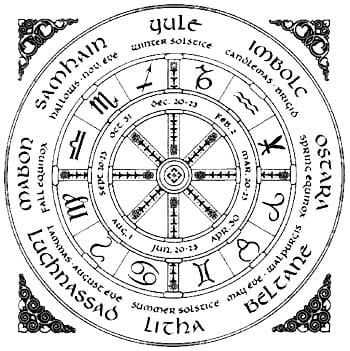
At this point in the diner in the novel, Wednesday convinces her to join him by conducting a social experiment. Their waitress seems not to know what the Christian Easter is about, so he asks her what she believes it means. She gives a slew of some Neo-pagan/Wiccan nonsense that really doesn’t represent what those belief systems entail and instead focuses on it being a representation of an all-powerful nameless Goddess of womanhood. It’s there Wednesday makes his strike and bets Easter that if they went out and asked a hundred strangers and he gave up a finger or toe for every person who knew her name, he would still come out with his digits intact. This is what wins her over by the end.
The series plays this out differently. Media crashes the party, seemingly friends with Easter. Clearly she’s not alone and a showdown is about to go down as the spook creepily begin to multiply around her. In a masterful act of both desperation and genius, the skies begin to darken. Wednesday, who FINALLY reveals himself as Odin, the All-father, hurdles a bolt of lightning at the spooks and dedicates their deaths to Ostara.
In a scene that is really, excuse my French, visually fucking beautiful, Ostara strips away the spring and turns all that was green into the grey of winter. I loved this honestly. Many of the Gods and Goddesses in the novels never really get to show off what they can do and end up being background characters. The stakes are higher now, too. Odin is willing to sacrifice lives to get his beliefs back because in the good old days for him, fear of disfavor created belief. Also, this is more so a personal opinion, but Celtic Gods really don’t get the credit that they deserve, considering half of our traditions and holidays come from their practices.
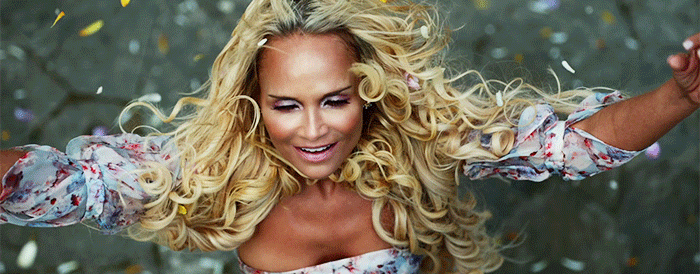
The Other Revelation
By now, it is well past time that Laura and Shadow were reunited. Of course her and Sweeney’s original destination was to get to Wisconsin for the “House on the Rock” meet up. With Sweeney’s sudden conscience check to get her truly reincarnated they arrive at Easter’s mansion. While I mentioned earlier that the book implies that Wednesday had a hand in Laura’s tragic demise, it was never actually made canon. Yet the evidence was there and with the blessing of Neil Gaiman, the show’s writers decided to make it canon for the series. I am totally on board with this. It adds to what animosity still remained between Wednesday and Shadow. It also gives Laura more of a story than just being there to take care of Shadow, and it adds a whole new air of drama to look forward to in the next season.
Of course once Laura gets suspicious about what Easter mentions regarding Sweeney, she grabs him by the sack to get a confession out of him. Poor Sweeney gets all types of abuse in this series. It won’t be surprising if they decided to kill him in the same way as the book. Anyway, by the end of the episode, Laura stands on the precipice of Wednesday’s flashy show with the most, ‘you got some splaining to do’ look on her face. Oh boy does he.
Final Thoughts
I had my doubts about how well the finale would be without including the “House on the Rock” segment, but man was I wrong. This turned out to be an excellent finale in my opinion. It created a lot of new drama for the show’s sophomore season, had a good deal of revelation, introduced new players to the game, and even offered a moment where you knew, this is war. While it was centered on another scene that was moved up too early, it did so while respecting what made that particular scene enjoyable in the novel and gave it the extra significance necessary to make it finale worthy.
With this being the close of the first season, I have to say that it wasn’t quite as good as I thought it would be. That doesn’t mean I didn’t enjoy it. I did. They remained faithful where it mattered the most and made some changes that made sense in the context of the shows worldbuilding. Some of my favorite characters got more screen time without giving them needless plot, which was awesome.
However, some scenes were put into places that really didn’t make all that much sense. Since these weren’t the main episode reviews, it’s hard to say more without putting my own opinion into the fold. So for the sake of argument, I will give it two grades. For now though, I hope you all enjoyed these book-to-screen review and I’ll see you next season. If you did like them, I do invite you to read my numerous comic reviews. And join me on July 7th when Castlevania arrives on Netflix!
